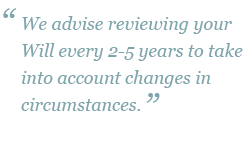
Wills
We probably all understand that we should have a Will but the reality is that most of us don’t have one. It’s important to understand what will happen to our estate if we die without a Will (intestate).
Making a Will is the only way to ensure that your wishes are carried out after your death. If you have not made a valid Will, your property will pass according to the Law of Intestacy. This may not be what you would have wished. In any event, it is likely to take longer to finalise than if you had made a Will. During this time your beneficiaries may not be able to draw any money from your estate. It can lead to arguments and distress for your relatives.
Food For Thought:
IF YOU ARE SINGLE
You might want your estate divided amongst friends, relatives and charities of your choosing and in the proportions you want.
IF YOU ARE MARRIED
Don’t assume “my other half will get everything”. Brothers and sisters or parents may have a claim. Often your children have a right to be part of your estate. If you are living as a couple but not officially married, you may be treated as a single person and a surviving partner may get nothing at all. One thing you can be certain of – there will be arguments and disputes at a time when the family should be coping with the loss of a loved one.
IF YOU ARE A PARENT
You should consider who you would like to look after your children in the event of your death. This is particularly important in the case of one parent families or unmarried parents living together. A valid Will nominating guardians are invaluable in such cases. If no one knows what you would have wanted, the Court will decide on the future of your children, and it may not be what you or your children would have wished.
IF YOU ARE RETIRED
Maybe you made a Will a long time ago. It probably needs updating to include additional grandchildren or deletion of persons you no longer feel you wish to leave anything to.
We advise reviewing your Will every 2-5 years to take into account changes in circumstances.

